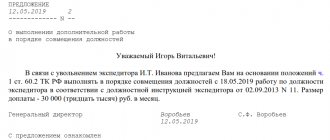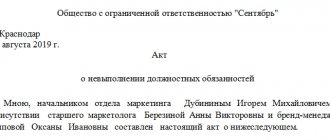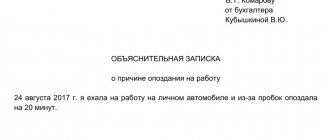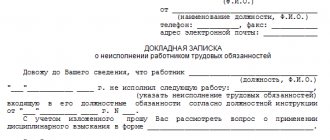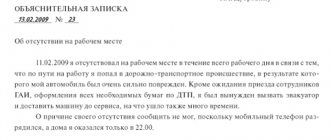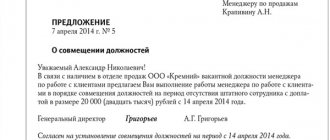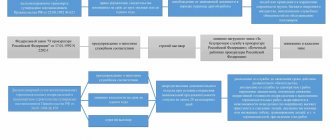Reprimand as a disciplinary sanction
When hiring a new employee, the employer discusses with him the specifics of his job functions, introduces him to the job description against his signature, and conducts safety training at the enterprise. If the established rules are strictly followed, a person should not have problems in his work. But, nevertheless, there are often situations when a worker violates these requirements, and his actions do not have the best effect on the work of the entire enterprise.
In this case, the employer is obliged to respond to the current circumstances, and sometimes it is necessary to punish the offender.
The main types of disciplinary sanctions that an employer can apply to an employee are specified in Art. 192 Labor Code of the Russian Federation. One of them is reprimand. An employee can receive a reprimand for various offenses. But the most common reasons for issuing it are:
- improper performance of labor duties;
- violation of labor discipline;
- neglect of safety precautions, etc.
We will discuss below how an employer should act if he has chosen this measure of influence on a worker.
Results
The employer has the right to punish a negligent employee for labor misconduct. It is important to fully understand his circumstances and complete all documents correctly so that the consequences of disciplinary action do not become the subject of legal proceedings. Among such documents is an order for disciplinary action, a sample of which is posted on our website.
Issuing a reprimand is an official procedure, fixed at the level of a local document (in an order from the head of the company), on the application of an appropriate disciplinary measure against an employee.
However, the issuance of this order must be properly formalized by the authorities by preparing a documentary base, including:
- sources recording the misconduct (memo, commission act);
- notifying the employee of the need to draw up an explanatory note;
- in case of failure to provide an explanatory note - a statement about this;
- in case of refusal to sign the order of reprimand by the employee, also the corresponding act.
A reprimand should not be called a severe reprimand, otherwise the labor inspectorate or court will cancel the order issuing it.
The reprimand must be justified. It can be issued due to the employee’s failure to fulfill only those duties that are recorded in the provisions of documents endorsed by the employee, such as an employment contract, job description, or company labor regulations.
Rules for issuing a reprimand
The most crucial moment is conducting an official investigation and completing the paperwork correctly. When issuing a suggestion, the employer must adhere to the procedure provided for by the Labor Code of the Russian Federation. Otherwise, the employee will be able to challenge it.
The employer has only a month from the date of discovery of the misconduct to declare a disciplinary sanction. If the employer decides to reprimand the employee, he must take the following actions:
- an internal investigation begins with documentary evidence of the employee’s misconduct. If this is absenteeism or being drunk at work, a report is drawn up. The contents of the act are confirmed by the signatures of the commission members (at least three people). In other cases, the employee’s immediate supervisor draws up a memo addressed to the director.
- Next, you need to require written explanations from the employee himself. If he does not submit them, an appropriate act should be drawn up.
- after this, you need to issue an order to issue a reprimand and familiarize the offender with it against his signature. If the employee refuses to sign it, you will also need to draw up a corresponding document.
Sample reprimand for improper performance of official duties
The official issuance of a reprimand is a legal fact, so this procedure must be properly formalized. The Labor Code of the Russian Federation and other federal regulations do not contain regulations that would determine how a reprimand is issued, but, based on practice, this action is recommended to be carried out according to the following algorithm:
- Firstly, the employer must document the fact of failure (or incorrect performance) by the employee of his duties. Most often, this is done by sending a memo to the director of the company by the immediate supervisor of the employee who committed the misconduct. An offense can also be recorded using a report drawn up by a commission formed by the head of the company to evaluate the employee’s actions.
- Secondly, the employer, before issuing a reprimand, must give the employee the opportunity to explain the actions he committed. To do this, it is necessary to send the employee a notice of the submission of an explanatory note.
- Thirdly, the employer needs to wait 2 days - this is how much time the employee has to draw up an explanatory note (Article 193 of the Labor Code of the Russian Federation). If he does not do this, the employer should draw up a corresponding act. Further (and also in the event that an explanation is presented, but the employee’s arguments do not look convincing), a reprimand can already be issued.
A reprimand is issued by issuing an order signed by the head of the company.
The order to issue a reprimand must:
- indicate that all the documents that we mentioned above are attached to it: a memorandum of misconduct (or an act of the commission), a notice of the need to submit an explanatory note, the explanatory note itself or an act of failure to submit it;
- indicate the dates and names of the relevant documents.
The order to issue a reprimand must be signed by:
- head of the company;
- by the employee himself within 3 days from the date of drawing up the order.
If the employee refuses to sign the document, it will be necessary to draw up a report about this (Article 193 of the Labor Code of the Russian Federation).
Information about the reprimand of an employee can be recorded in the personal file.
In order not to create a new document every time and not remember how this or that information is presented in it, it is better for the company to use a ready-made template. We present one version of the document on the website. Before reprimanding an employee, management will have to take this example as a basis and, if necessary, changing the wording and surname of the offending employee, print the required order.
Design rules
As we noted above, censure is documented, in the form of an order. The employer's order to apply a disciplinary sanction is announced to the employee against signature within three working days from the date of its issuance, not counting the time the employee is absent from work. The document must contain the following information:
- position, full name of the offending employee;
- a summary of the incident indicating the exact date and time;
- the essence of the order in accordance with the Labor Code of the Russian Federation;
- a list of documents that served as the basis for drawing up the order;
- signatures of a commission of three people;
- date and personal signature of the culprit confirming that he has read the document. If the employee flatly refuses to sign, a corresponding report is drawn up.
How to create an order
The legislator has not defined the form of an order to punish an employee for individual entrepreneurs or legal entities of other forms of ownership. The general situation is this:
- if the penalty is a reprimand or reprimand, then the order is drawn up in any form;
- if the sanction is dismissal, then the document is issued according to the unified form T-8 (approved by the Resolution of the State Statistics Committee of Russia dated January 5, 2004) or an independently developed form.
The order reflects the following information:
- Full name of the employee;
- job title;
- the structural unit where the employee works;
- describe the violation, indicate documents confirming the fact, violated provisions of the contract, instructions, norms containing provisions of labor law, including local acts of the employer;
- the circumstances of the violation, the severity and guilt of the employee;
- type of punishment;
- basis for issuing a local act (details of the document in which the offense is recorded).
Here is what a sample order to punish an employee for a violation looks like:
STATE BUDGETARY EDUCATIONAL INSTITUTION FOR ADDITIONAL CHILDREN’S EDUCATION SPECIALIZED CHILDREN AND YOUTH SPORTS SCHOOL OF OLYMPIC RESERVE “ALLUR”
(GBOU DOD SDYUSSHOR "ALLUR")
about disciplinary action in the form of a reprimand
Due to the absence of riding coach P.P. Petrov from work. 05/11/2020 from 10:00 to 13:00 and the injury received during this period by student Sazonov S.S. (dislocation of the arm joint)
Reprimand the riding coach P.P. Petrov.
— memo from the head of the riding department, Anisimova A.A. from 12.05. 2020;
- medical report on the injury of Sazonov S.S. dated May 11, 2020.
Director ____________________ Ivanov I.I.
Head of the riding department ____________________ Anisimova A.A.
The employee is familiar with the order ______________________ Petrov P.P.
Can an employee be given a “severe reprimand”?
It is worth noting that the Labor Code of the Russian Federation does not provide for such a thing as a severe reprimand. However, according to Art. 189 of the Labor Code of the Russian Federation, for certain categories of employees other types of disciplinary sanctions may be provided for, established by separate legal acts. An example of legislative acts that provide for the use of a severe reprimand are:
- Art. 41.7 Federal Law “On the Prosecutor’s Office of the Russian Federation”;
- Art. 29 Federal Law “On service in the customs authorities of the Russian Federation”;
- Chapter 4, paragraph 54 of the Disciplinary Charter of the Armed Forces of the Russian Federation, etc.
Persons regulated by these laws may be legally subject to severe reprimand. In any case, the employee cannot be reprimanded and recorded in his personal file, since information about the reprimand is not entered in his personal file. But you can add it to your personal card to track whether the employee has disciplinary sanctions.
Good and bad reasons
However, sometimes failure to appear is not considered absenteeism. A person will be able to avoid consequences for not attending work in the following situations:
- He was engaged in the performance of government duties. This includes a visit to the police, participation in court proceedings or a visit to the military registration and enlistment office.
- The employee was unaware that he had to report for his shift due to a schedule change. The reason can be cited if the person was not notified in writing of the adjustments. Oral communication has no legal force.
- The employee was arrested or taken into custody.
- The person refused to go out on a legal day off or during vacation, even if an order was issued. A similar rule applies if the employee was not familiarized with the document in advance.
- The person went to donate blood on the day prescribed by health workers or needs rest after the procedure. The above rule applies if a person acts as a donor.
- The citizen fell ill. This fact will need to be confirmed by providing a medical certificate.
The above list can be supplemented.
Other reasons are recorded in the local regulations of the organization. If a conflict occurs, it is recommended that you familiarize yourself in detail not only with the employment contract, but also with the internal regulations of the institution. The exact list of valid reasons is not fixed in the legislation. The boss will decide to what extent the available grounds justify the citizen’s actions. He makes a verdict and determines the punishment.
Sometimes finding out where a subordinate was was problematic. In this case, dismissal is carried out. Companies do not want to work with irresponsible people.
While a person is not at work, the boss records the absence and does not pay for working hours.
Consequences for the employee
If an employee is reprimanded at work, the consequences may be as follows:
- this may serve as a basis for deprivation of the bonus (if this is indicated in the Regulations on bonuses);
- in cases where the violations are systematic and the offender makes no attempt to correct the situation, two such suggestions may be enough to dismiss the employee - for example, in the case of regular absenteeism, or alcohol abuse.
The suggestion is valid for a year, after which the employee is considered not to have a disciplinary sanction, although the employer, if desired, can remove the sanction earlier by formalizing this action with a separate order.
What to do before issuing a reprimand order
The procedure is simple and described in detail in the code:
- record a violation;
- demand an explanation;
- study the employee’s history (were there any comments or warnings and what was the result);
- issue a reprimand order.
The employer himself decides whether to hold the employee accountable or not, because this is his right, in accordance with Art. 22 Labor Code of the Russian Federation. No such responsibility is assigned to him. Sometimes it's fair to step up to the plate. How, for example, to punish a latecomer if the whole city is stuck in a traffic jam due to a big accident. But if the employer is too loyal to the attacks of employees, he will create chaos, and it will be difficult to streamline the work atmosphere. Therefore, it is better to adequately and timely respond to violations and bring those responsible to justice.

